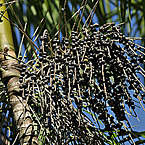Acai

On this page:
Introduction
This fact sheet provides basic information about acai (pronounced ah-sigh-EE)—common names, what the science says, potential side effects and cautions, and resources for more information.
The acai palm tree, native to tropical Central and South America, produces a reddish-purple berry. The acai berry’s name, which comes from a language of the native people of the region, means “fruit that cries.” The acai berry has long been an important food source for indigenous peoples of the Amazon region, who also use acai for a variety of health-related purposes.
Acai berry products have become popular in the United States, where they have been marketed as folk or traditional remedies for weight-loss and anti-aging purposes, but there is no definitive scientific evidence to support these claims. Acai fruit pulp has been used experimentally as an oral contrast agent for magnetic resonance imaging (MRI) of the gastrointestinal tract.
Acai berry products are available as juices, powders, tablets, and capsules.
What the Science Says
- There is no definitive scientific evidence based on studies in humans to support the use of acai berry for any health-related purpose.
- No independent studies have been published in peer-reviewed journals that substantiate claims that acai supplements alone promote rapid weight loss. Researchers who investigated the safety profile of an acai-fortified juice in animals observed that there were no body weight changes in rats given the juice compared with controls.
- Laboratory studies have focused on acai berry’s potential antioxidant properties (antioxidants are substances that are thought to protect cells from damaging effects of chemical reactions with oxygen). Laboratory studies also have shown that acai berries demonstrate anti-cancer and anti-inflammatory activity.
Side Effects and Cautions
- There is little reliable information about the safety of acai as a supplement. It is widely consumed as an edible fruit or as a juice.
- People who are allergic to acai or to plants in the Arecaceae (palm) family should not consume acai.
- Consuming acai might affect MRI test results. If you use acai products and are scheduled for an MRI, check with your health care provider.
- Tell all your health care providers about any complementary health practices you use. Give them a full picture of what you do to manage your health. This will help ensure coordinated and safe care. For tips about talking with your health care providers about complementary and alternative medicine, see NCCAM's Time to Talk campaign.
Sources
- Acai. Natural Medicines Comprehensive Database Web site. Accessed at www.naturaldatabase.com on April 19, 2011.
- Acai (Euterpe oleracea). Natural Standard Database Web site. Accessed at www.naturalstandard.com on April 19, 2011.
- Acai berry diet. Natural Standard Database Web site. Accessed at www.naturalstandard.com on April 19, 2011.
- Marcason W. What is the açaí berry and are there health benefits? Journal of the American Dietetic Association. 2009;109(11):1968.
- Schreckinger ME, Lotton J, Lila MA, et al. Berries from South America: a comprehensive review on chemistry, health potential, and commercialization. Journal of Medicinal Food. 2010;13(2):233–246.
For More Information
NCCAM Clearinghouse
The NCCAM Clearinghouse provides information on NCCAM and complementary health approaches, including publications and searches of Federal databases of scientific and medical literature. The Clearinghouse does not provide medical advice, treatment recommendations, or referrals to practitioners.
PubMed®
A service of the National Library of Medicine (NLM), PubMed® contains publication information and (in most cases) brief summaries of articles from scientific and medical journals.
Office of Dietary Supplements (ODS), National Institutes of Health (NIH)
ODS seeks to strengthen knowledge and understanding of dietary supplements by evaluating scientific information, supporting research, sharing research results, and educating the public. Its resources include publications (such as Dietary Supplements: What You Need to Know), fact sheets on a variety of specific supplement ingredients and products (such as vitamin D and multivitamin/mineral supplements), and the PubMed® Dietary Supplement Subset.
This publication is not copyrighted and is in the public domain. Duplication is encouraged.
* Note: PDF files require a viewer such as the free Adobe Reader.
